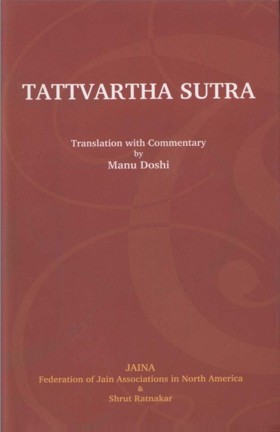07.04 Hinsadishvihāmutra Chāpāyavadyadarshanam
Audio: Sanskrit: हिंसादिष्विहामुत्र चापायावद्यदर्शनम् ।
Hindi: हिंसा आदि पांच दोषो में ऐहिक आपत्ति और पारलौकिक अनिष्ट का दर्शन करना।
07.05 Duhkhameva Vā
Audio: Sanskrit: दुःखमेव वा ।
Hindi: अथवा हिंसा आदि दोषों में दुःख ही है, ऐसी भावना करना।
07.06: Maitripramodkarunymādhyasthāni Sattvagun-ādhikklīshyamānāvineyeshu
Audio: Sanskrit: मैत्रीप्रमोदकारूण्यमाध्यस्थ्यानि सत्त्वगुणाधिकक्लिश्यमानाविनेयेषु।
Hindi: प्राणिमात्र के प्रति मैत्री-वृत्ति, गुणिजनों के प्रति प्रमोद-वृत्ति, दुःखीजनों के प्रति करुणा-वृत्ति और अयोग्य पात्रों के प्रति माध्यस्थ्य-वृत्ति रखना।
07.07 Jagatkayswabhavau Cha Samvegvairāgyārtham
Audio: Sanskrit: जगत्कायस्वभावौ च संवेगवैराग्यार्थम् ।
Hindi: संवेग तथा वैराग्य के लिए जगत् के स्वभाव और शरीर के स्वरूप का चिंतन करना।
07.04-07
English: These sutras specify a few additional Bhāvanās. Sutra 4 urges to recognize the evil involved in violence etc. and the unwholesome impact thereof in the present life as well as in the life hereafter. This is very vital; one may not be inclined to give up anything unless he realizes the evil impact thereof. Sutra 5 goes further and asks to treat violence, etc. as inherent evils.
Sutra 6 stresses the importance of amity etc. Observance of non-violence and other restraints necessitate the sense of amity for all. In worldly life, we come across different people ranging from the highly virtuous to the wicked ones. How to deal with them, with equanimity and peace of mind would be a problem. This sutra provides the guidance. It stipulates that we should be friendly towards equals, adore the virtuous, have compassion for the downtrodden and maintain objectivity towards those not amenable to reason.
Sutra 7 stresses the vital importance of contemplating about the nature of worldly life so as to cultivate the sense of detachment and to promote the urge for liberation. When one contemplates about that, he can make out that everything in the world is ephemeral and nothing stays forever. As such, he can develop detachment for that and would start yearning for liberation. Without the sense of detachment and acute desire for liberation, it would be hard to adhere to the restraints.
In order to make out the significance of the restraints and to properly observe the same, it is necessary to make out the faults like violence, untruth, etc. which are inherent in non-observance of restraints. Such faults are considered in sutras 8 to 12.
 Acharya Umaswati
Acharya Umaswati
